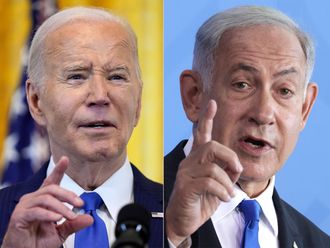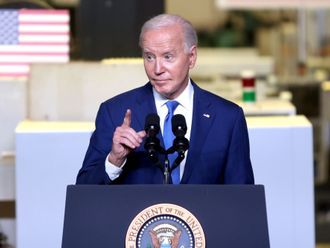HAVANA: The Colombian government and FARC guerrillas have begun working together on clearing the country’s landmines, officials said Friday, but their peace talks remain fragile amid a surge in fighting.
FARC members and an army battalion carried out a preliminary seven-day mission to locate anti-personnel mines in the northern department of Antioquia, said officials from Cuba and Norway, the countries facilitating the talks.
The pilot mission is the first step in a March agreement between the government and the Marxist guerrillas to disable all mines placed during half a century of civil war.
“This is a hopeful gesture for peace in Colombia,” said FARC commander and peace negotiator Pastor Alape at the talks in Havana.
The goal of the preliminary mission was “to gather information to identify the areas that are really contaminated with mines,” said Cuban diplomat Rodolfo Benitez.
Subsequent missions will remove and destroy the mines, officials said.
Colombia has the second highest number of landmine casualties in the world after Afghanistan.
Since 1990, mines have killed more than 2,000 people and wounded more than 9,000.
But while the joint mine clearing initiative has been broadly welcomed as a sign of progress at the peace talks, tensions have soared since the FARC killed 11 soldiers in an ambush last month, despite having declared a unilateral ceasefire in December.
They defended the attack as a “defensive action” against an army siege, but President Juan Manuel Santos ordered the resumption of air strikes on FARC positions, which he had suspended in recognition of their ceasefire.
Some 40 FARC fighters have been killed in air and ground strikes since last week, including two high-ranking commanders.
The FARC in turn killed three soldiers in clashes this week in the oilfields of the Arauca department, near the Venezuelan border.
Analyst Ariel Avila of Colombia’s Peace and Reconciliation Foundation said he fears an “unstoppable spiral of violence in the coming weeks,” jeopardising the peace talks opened in November 2012.
“The risk for the peace process is very high,” he said.
Previous efforts to negotiate a peace deal have all been derailed by fighting on the ground.
The new violence comes as Santos prepares to head to Brussels for the European Union’s annual summit with the Community of Latin American and Caribbean States.
Santos, who won a new term last year in elections seen as a referendum on the peace process, will be in an awkward position with the EU, which has condemned the increase in hostilities.
“Santos’s plans to look like the great peacemaker are going to be a little rattled,” said a European diplomat in Bogota.
The peace talks in Cuba have reached partial deals on several issues but have yet to yield a final accord.
The Colombian conflict has killed more than 200,000 people and uprooted more than six million since the Revolutionary Armed Forces of Colombia launched its guerrilla war in 1964.
—AFP












